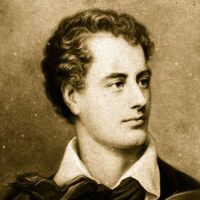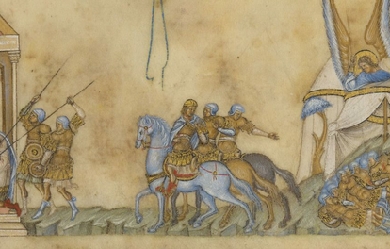
Ode to Napoleon Buonaparte
I
’TIS done—but yesterday a King!
And arm’d with Kings to strive—
And now thou art a nameless thing:
So abject—yet alive!
Is this the man of thousand thrones,
Who strew’d our earth with hostile bones,
And can he thus survive?
Since he, miscall’d the Morning Star,
Nor man nor fiend hath fallen so far.
II
Ill-minded man! why scourge thy kind
Who bow’d so low the knee?
By gazing on thyself grown blind,
Thou taught’st the rest to see.
With might unquestion’d,—power to save,—
Thine only gift hath been the grave,
To those that worshipp’d thee;
Nor till thy fall could mortals guess
Ambition’s less than littleness!
III
Thanks for that lesson—It will teach
To after-warriors more,
Than high Philosophy can preach,
And vainly preach’d before.
That spell upon the minds of men
Breaks never to unite again,
That led them to adore
Those Pagod things of sabre sway
With fronts of brass, and feet of clay.
IV
The triumph and the vanity,
The rapture of the strife—
The earthquake voice of Victory,
To thee the breath of life;
The sword, the sceptre, and that sway
Which man seem’d made but to obey,
Wherewith renown was rife—
All quell’d!—Dark Spirit! what must be
The madness of thy memory!
V
The Desolator desolate!
The Victor overthrown!
The Arbiter of others’ fate
A Suppliant for his own!
Is it some yet imperial hope
That with such change can calmly cope?
Or dread of death alone?
To die a prince—or live a slave—
Thy choice is most ignobly brave!
VI
He who of old would rend the oak,
Dream’d not of the rebound:
Chain’d by the trunk he vainly broke—
Alone—how look’d he round?
Thou, in the sternness of thy strength,
An equal deed hast done at length,
And darker fate hast found:
He fell, the forest prowler’s prey;
But thou must eat thy heart away!
VII
The Roman, when his burning heart
Was slaked with blood of Rome,
Threw down the dagger—dared depart,
In savage grandeur, home—
He dared depart in utter scorn
Of men that such a yoke had borne,
Yet left him such a doom!
His only glory was that hour
Of self-upheld abandon’d power.
VIII
The Spaniard, when the lust of sway
Had lost its quickening spell,
Cast crowns for rosaries away,
An empire for a cell;
A strict accountant of his beads,
A subtle disputant on creeds,
His dotage trifled well:
Yet better had he neither known
A bigot’s shrine, nor despot’s throne.
IX
But thou—from thy reluctant hand
The thunderbolt is wrung—
Too late thou leav’st the high command
To which thy weakness clung;
All Evil Spirit as thou art,
It is enough to grieve the heart
To see thine own unstrung;
To think that God’s fair world hath been
The footstool of a thing so mean;
X
And Earth hath spilt her blood for him,
Who thus can hoard his own!
And Monarchs bow’d the trembling limb,
And thank’d him for a throne!
Fair Freedom! we may hold thee dear,
When thus thy mightiest foes their fear
In humblest guise have shown.
Oh! ne’er may tyrant leave behind
A brighter name to lure mankind!
XI
Thine evil deeds are writ in gore,
Nor written thus in vain—
Thy triumphs tell of fame no more,
Or deepen every stain:
If thou hadst died as honour dies,
Some new Napoleon might arise,
To shame the world again—
But who would soar the solar height,
To set in such a starless night?
XII
Weigh’d in the balance, hero dust
Is vile as vulgar clay;
Thy scales, Mortality! are just
To all that pass away:
But yet methought the living great
Some higher sparks should animate,
To dazzle and dismay:
Nor deem’d Contempt could thus make mirth
Of these, the Conquerors of the earth.
XIII
And she, proud Austria’s mournful flower,
Thy still imperial bride;
How bears her breast the torturing hour?
Still clings she to thy side?
Must she too bend, must she too share
Thy late repentance, long despair,
Thou throneless Homicide?
If still she loves thee, hoard that gem,—
’Tis worth thy vanish’d diadem!
XIV
Then haste thee to thy sullen Isle,
And gaze upon the sea;
That element may meet thy smile—
It ne’er was ruled by thee!
Or trace with thine all idle hand
In loitering mood upon the sand
That Earth is now as free!
That Corinth’s pedagogue hath now
Transferr’d his by-word to thy brow.
XV
Thou Timour! in his captive’s cage
What thought will there be thine,
While brooding in thy prison’d rage?
But one—"The word was mine!”
Unless, like he of Babylon,
All sense is with thy sceptre gone,
Life will not long confine
That spirit pour’d so widely forth—
So long obey’d—so little worth!
XVI
Or, like the thief of fire from heaven,
Wilt thou withstand the shock?
And share with him, the unforgiven,
His vulture and his rock!
Foredoom’d by God—by man accurst,
And that last act, though not thy worst,
The very Fiend’s arch mock;
He in his fall preserved his pride,
And, if a mortal, had as proudly died!
XVII
There was a day—there was an hour,
While earth was Gaul’s—Gaul thine—
When that immeasurable power
Unsated to resign
Had been an act of purer fame
Than gathers round Marengo’s name,
And gilded thy decline,
Through the long twilight of all time,
Despite some passing clouds of crime.
XVIII
But thou forsooth must be a king,
And don the purple vest,
As if that foolish robe could wring
Remembrance from thy breast.
Where is that faded garment? where
The gewgaws thou wert fond to wear,
The star, the string, the crest?
Vain froward child of empire! say,
Are all thy playthings snatched away?
XIX
Where may the wearied eye repose
When gazing on the Great;
Where neither guilty glory glows,
Nor despicable state?
Yes—one—the first—the last—the best—
The Cincinnatus of the West,
Whom envy dared not hate,
Bequeath’d the name of Washington,
To make man blush there was but one!



